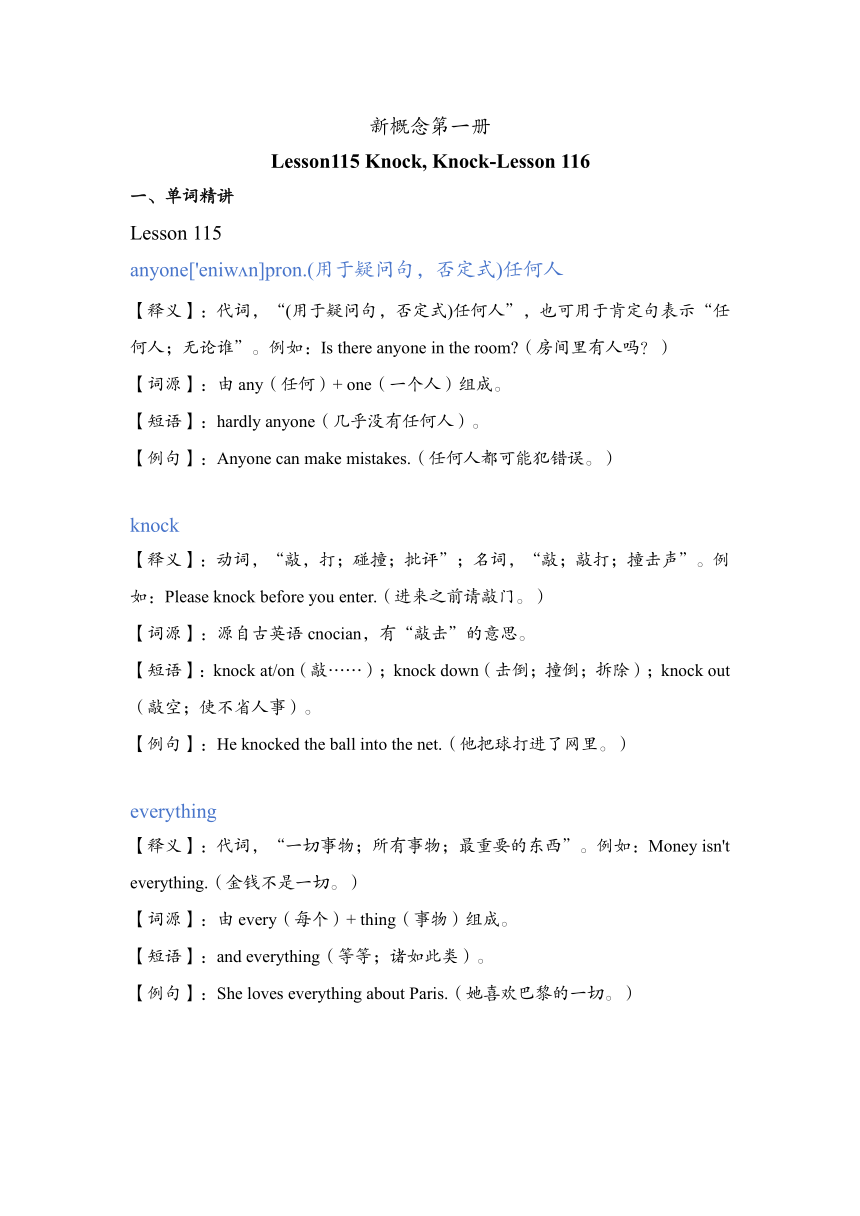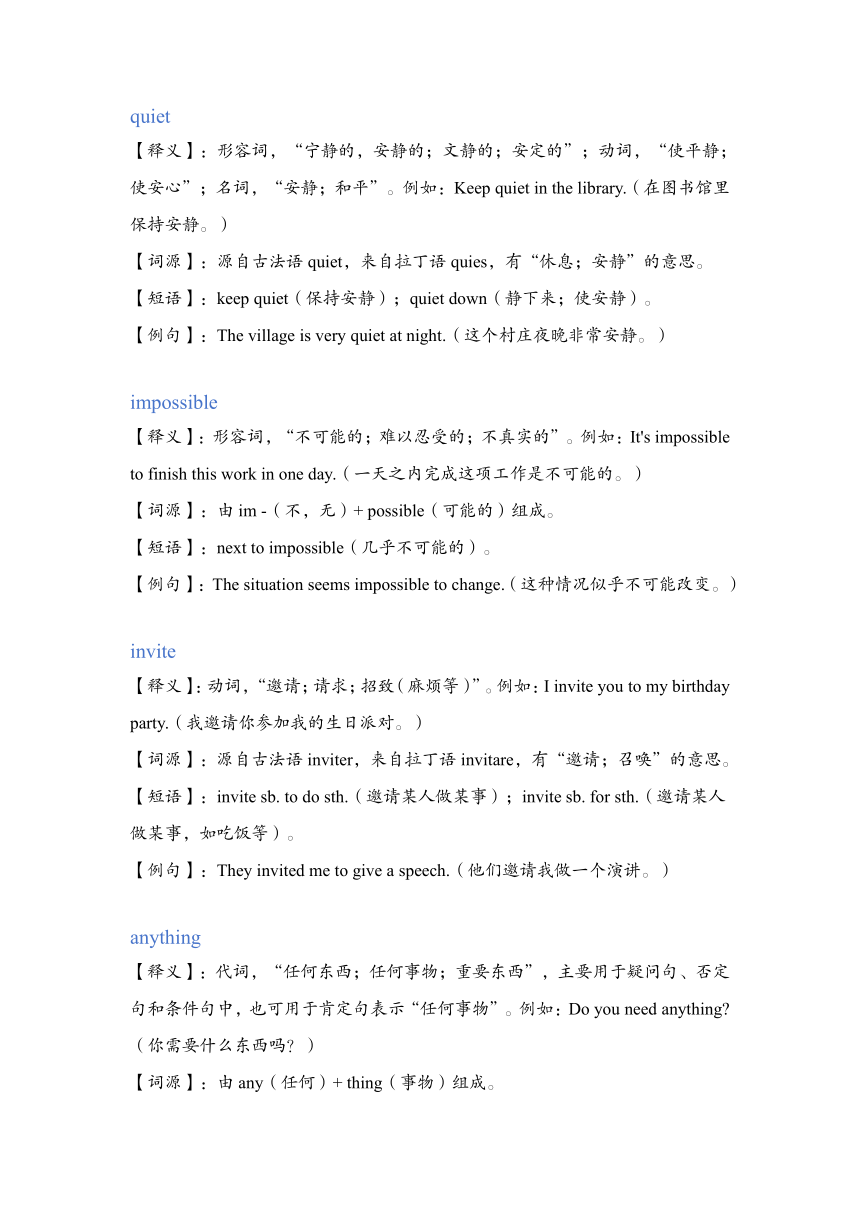新概念第一册 Lesson 115 Knock, Knock-Lesson 116 讲义
文档属性
| 名称 | 新概念第一册 Lesson 115 Knock, Knock-Lesson 116 讲义 |  | |
| 格式 | docx | ||
| 文件大小 | 124.6KB | ||
| 资源类型 | 教案 | ||
| 版本资源 | 新概念英语 | ||
| 科目 | 英语 | ||
| 更新时间 | 2024-12-03 22:21:04 | ||
图片预览




文档简介
新概念第一册
Lesson115 Knock, Knock-Lesson 116
单词精讲
Lesson 115
anyone['eniw n]pron.(用于疑问句,否定式)任何人
【释义】:代词,“(用于疑问句,否定式)任何人”,也可用于肯定句表示“任何人;无论谁”。例如:Is there anyone in the room (房间里有人吗?)
【词源】:由any(任何)+ one(一个人)组成。
【短语】:hardly anyone(几乎没有任何人)。
【例句】:Anyone can make mistakes.(任何人都可能犯错误。)
knock
【释义】:动词,“敲,打;碰撞;批评”;名词,“敲;敲打;撞击声”。例如:Please knock before you enter.(进来之前请敲门。)
【词源】:源自古英语cnocian,有“敲击”的意思。
【短语】:knock at/on(敲……);knock down(击倒;撞倒;拆除);knock out(敲空;使不省人事)。
【例句】:He knocked the ball into the net.(他把球打进了网里。)
everything
【释义】:代词,“一切事物;所有事物;最重要的东西”。例如:Money isn't everything.(金钱不是一切。)
【词源】:由every(每个)+ thing(事物)组成。
【短语】:and everything(等等;诸如此类)。
【例句】:She loves everything about Paris.(她喜欢巴黎的一切。)
quiet
【释义】:形容词,“宁静的,安静的;文静的;安定的”;动词,“使平静;使安心”;名词,“安静;和平”。例如:Keep quiet in the library.(在图书馆里保持安静。)
【词源】:源自古法语quiet,来自拉丁语quies,有“休息;安静”的意思。
【短语】:keep quiet(保持安静);quiet down(静下来;使安静)。
【例句】:The village is very quiet at night.(这个村庄夜晚非常安静。)
impossible
【释义】:形容词,“不可能的;难以忍受的;不真实的”。例如:It's impossible to finish this work in one day.(一天之内完成这项工作是不可能的。)
【词源】:由im -(不,无)+ possible(可能的)组成。
【短语】:next to impossible(几乎不可能的)。
【例句】:The situation seems impossible to change.(这种情况似乎不可能改变。)
invite
【释义】:动词,“邀请;请求;招致(麻烦等)”。例如:I invite you to my birthday party.(我邀请你参加我的生日派对。)
【词源】:源自古法语inviter,来自拉丁语invitare,有“邀请;召唤”的意思。
【短语】:invite sb. to do sth.(邀请某人做某事);invite sb. for sth.(邀请某人做某事,如吃饭等)。
【例句】:They invited me to give a speech.(他们邀请我做一个演讲。)
anything
【释义】:代词,“任何东西;任何事物;重要东西”,主要用于疑问句、否定句和条件句中,也可用于肯定句表示“任何事物”。例如:Do you need anything (你需要什么东西吗?)
【词源】:由any(任何)+ thing(事物)组成。
【短语】:anything but(根本不;决不)。
【例句】:You can choose anything you like.(你可以选择任何你喜欢的东西。)
nothing
【释义】:代词,“什么也没有;没有东西;无关紧要的东西”;名词,“无;零;不关紧要之事”;副词,“毫不;决不”。例如:There is nothing in the box.(盒子里什么也没有。)
【词源】:由no(没有)+ thing(事物)组成。
【短语】:for nothing(免费;徒然;无缘无故);nothing to do with(与……无关)。
【例句】:He said nothing about his plan.(他对他的计划只字未提。)
lemonade
【释义】:名词,“柠檬水”。例如:I'd like a glass of lemonade.(我想要一杯柠檬水。)
【词源】:由lemon(柠檬)+ -ade(表示某种饮料的后缀)组成。
【短语】:ice - cold lemonade(冰柠檬水)。
【例句】:This lemonade tastes very sour.(这种柠檬水尝起来很酸。)
joke
【释义】:动词,“开玩笑;戏弄;说笑话”;名词,“笑话;玩笑;笑柄”。例如:Don't joke about it.(不要拿它开玩笑。)
【词源】:源自古法语joke,最初表示“玩笑;滑稽的事”。
【短语】:play a joke on(开……的玩笑);tell a joke(讲笑话)。
【例句】:He told a very funny joke.(他讲了一个非常有趣的笑话。)
Lesson 116
asleep [ 'sli:p] a.睡觉,睡着(用作表语)
【释义】:形容词,“睡觉,睡着(用作表语)”,表示一种状态。例如:The baby is asleep.(婴儿睡着了。)
【词源】:由a -(处于……状态)+ sleep(睡觉)组成。
【短语】:fall asleep(入睡)。
【例句】:He was asleep when I came in.(我进来的时候他正在睡觉。)
glasses
【释义】:名词,“眼镜”,复数形式,也可表示“玻璃杯”的复数。例如:He wears glasses.(他戴眼镜。)
【词源】:源自古法语glas,最初表示“玻璃”,加上 - es表示复数形式用于指眼镜等。
【短语】:a pair of glasses(一副眼镜)。
【例句】:I need to clean my glasses.(我需要擦我的眼镜。)
词法
1. 不定代词
(1)一般用于肯定句:some,someone,somebody,something
(2)一般用于否定句和疑问句:any,anyone,anybody,anything
(3)否定代词:no,no one,nobody,nothing
(4)概括代词:every,everyone,everybody,everything
2.不定副词:everywhere,nowhere,anywhere,somewhere
可在口语中单独使用,或在句子里充当状语
3. 动词短语:
(1)动词+介词:knock……
knock on the window 敲击窗户
knock at the table 敲桌子
(2)动词+介词:look……
Look through 表示透过……看……;浏览
look through the window 透过窗户看
4. 表方式的介词:
through:穿过,贯穿(内部穿过)
He is walking through the woods.他正在穿过树林。
5.表示否定与轻蔑的前缀:im- 用在 m,p 前
“可能的”possible-impossible“不可能的”
6. 过去分词做定语,做后置定语时,可以表示被动意义
I have a lot of money left.我还有很多钱。
The language spoken in my country is Chinese.我在我国说的语言是中文。
重点句型
不定代词
(1)every(每一),no(无),any(若干)及some(一些)可与one,thing构成复合代词,与where构成复合副词。不定代词可作主语、宾语和表语。
A 作主语:
这些代词作主语时都作单数看待,因此使用单数谓语动词。
Everyone is asleep.
大家都睡了。
Everything is untidy.
一切都乱糟糟的。
Nobody has told me about it.
没有人告诉过我有关这件事的情况。
B 作宾语:
I've got nothing to wear.
我没有穿的衣服了。
I've heard nothing.
我没听到什么动静。
I saw no one.
我谁也没有看到。
C 作表语:
There's nothing on the shelf.
架子上什么也没有。
There's somebody in the garden.
花园里有个人。
That's nothing.
那没什么。
(2)与some与any的用法一样,somebody/someone/ something/ somewhere一般用于肯定句;anybody/anyone/anything/ anywhere用于疑问句与否定句;nothing/nobody/no one/ nowhere 相当于 not anything/anybody/anyone/anywhere:
Someone is asking to see you.
有人要求见你。
There's something under that chair!
那个椅子下有个什么东西!
I don't know anyone here.
这儿我谁也不认识。
Is there anything on this shelf
这个架子上有什么东西吗?
I went nowhere.(=I didn't go anywhere.)
我哪儿也没去。
I saw no one.(=I didn't see anyone.)
我谁也没看到。
四、课文精讲
1. Isn't there anyone at home
【译文】家里没有人吗?
【用法】这是一个否定疑问句。否定疑问句在翻译成中文的时候一般都是“难道……不……”或者“难道……没有……”的结构。anyone用于否定句及疑问句中。试比较:
There is someone at home.家里有人。
2. Carol and Tom invited us to lunch.
【译文】卡罗尔和汤姆请我们来吃午饭。
【用法】(1)句中的to是介词,后面跟名词lunch。
(2)这句话还可以用动词不定式表示:
Carol and Tom invited us to have lunch.
3.It's nice and warm out here.
【译文】外面挺暖和。
【用法】nice and用于形容词及副词之前,表示肯定或加强语调的意思。例如:
It's nice and warm sitting by the fire.坐在火边温暖舒适。
The book is nice and instructive.这本书是很有益的。
4. Come and have something to drink.
【译文】来喝点什么吧。
【用法】and与动词原形连用,引出另外一个动作。例如:
Come and have coffee with me.来跟我一起喝杯咖啡吧。
You'll go and see him.你去看看他。
5. There's none left.
【译文】一点都不剩了。
【用法】left是leave的过去分词,修饰none,表示“剩下的,没用完的”。
There's enough bread left,we don't have to buy more.
还有足够的面包,我们不必再买了。
Lesson115 Knock, Knock-Lesson 116
单词精讲
Lesson 115
anyone['eniw n]pron.(用于疑问句,否定式)任何人
【释义】:代词,“(用于疑问句,否定式)任何人”,也可用于肯定句表示“任何人;无论谁”。例如:Is there anyone in the room (房间里有人吗?)
【词源】:由any(任何)+ one(一个人)组成。
【短语】:hardly anyone(几乎没有任何人)。
【例句】:Anyone can make mistakes.(任何人都可能犯错误。)
knock
【释义】:动词,“敲,打;碰撞;批评”;名词,“敲;敲打;撞击声”。例如:Please knock before you enter.(进来之前请敲门。)
【词源】:源自古英语cnocian,有“敲击”的意思。
【短语】:knock at/on(敲……);knock down(击倒;撞倒;拆除);knock out(敲空;使不省人事)。
【例句】:He knocked the ball into the net.(他把球打进了网里。)
everything
【释义】:代词,“一切事物;所有事物;最重要的东西”。例如:Money isn't everything.(金钱不是一切。)
【词源】:由every(每个)+ thing(事物)组成。
【短语】:and everything(等等;诸如此类)。
【例句】:She loves everything about Paris.(她喜欢巴黎的一切。)
quiet
【释义】:形容词,“宁静的,安静的;文静的;安定的”;动词,“使平静;使安心”;名词,“安静;和平”。例如:Keep quiet in the library.(在图书馆里保持安静。)
【词源】:源自古法语quiet,来自拉丁语quies,有“休息;安静”的意思。
【短语】:keep quiet(保持安静);quiet down(静下来;使安静)。
【例句】:The village is very quiet at night.(这个村庄夜晚非常安静。)
impossible
【释义】:形容词,“不可能的;难以忍受的;不真实的”。例如:It's impossible to finish this work in one day.(一天之内完成这项工作是不可能的。)
【词源】:由im -(不,无)+ possible(可能的)组成。
【短语】:next to impossible(几乎不可能的)。
【例句】:The situation seems impossible to change.(这种情况似乎不可能改变。)
invite
【释义】:动词,“邀请;请求;招致(麻烦等)”。例如:I invite you to my birthday party.(我邀请你参加我的生日派对。)
【词源】:源自古法语inviter,来自拉丁语invitare,有“邀请;召唤”的意思。
【短语】:invite sb. to do sth.(邀请某人做某事);invite sb. for sth.(邀请某人做某事,如吃饭等)。
【例句】:They invited me to give a speech.(他们邀请我做一个演讲。)
anything
【释义】:代词,“任何东西;任何事物;重要东西”,主要用于疑问句、否定句和条件句中,也可用于肯定句表示“任何事物”。例如:Do you need anything (你需要什么东西吗?)
【词源】:由any(任何)+ thing(事物)组成。
【短语】:anything but(根本不;决不)。
【例句】:You can choose anything you like.(你可以选择任何你喜欢的东西。)
nothing
【释义】:代词,“什么也没有;没有东西;无关紧要的东西”;名词,“无;零;不关紧要之事”;副词,“毫不;决不”。例如:There is nothing in the box.(盒子里什么也没有。)
【词源】:由no(没有)+ thing(事物)组成。
【短语】:for nothing(免费;徒然;无缘无故);nothing to do with(与……无关)。
【例句】:He said nothing about his plan.(他对他的计划只字未提。)
lemonade
【释义】:名词,“柠檬水”。例如:I'd like a glass of lemonade.(我想要一杯柠檬水。)
【词源】:由lemon(柠檬)+ -ade(表示某种饮料的后缀)组成。
【短语】:ice - cold lemonade(冰柠檬水)。
【例句】:This lemonade tastes very sour.(这种柠檬水尝起来很酸。)
joke
【释义】:动词,“开玩笑;戏弄;说笑话”;名词,“笑话;玩笑;笑柄”。例如:Don't joke about it.(不要拿它开玩笑。)
【词源】:源自古法语joke,最初表示“玩笑;滑稽的事”。
【短语】:play a joke on(开……的玩笑);tell a joke(讲笑话)。
【例句】:He told a very funny joke.(他讲了一个非常有趣的笑话。)
Lesson 116
asleep [ 'sli:p] a.睡觉,睡着(用作表语)
【释义】:形容词,“睡觉,睡着(用作表语)”,表示一种状态。例如:The baby is asleep.(婴儿睡着了。)
【词源】:由a -(处于……状态)+ sleep(睡觉)组成。
【短语】:fall asleep(入睡)。
【例句】:He was asleep when I came in.(我进来的时候他正在睡觉。)
glasses
【释义】:名词,“眼镜”,复数形式,也可表示“玻璃杯”的复数。例如:He wears glasses.(他戴眼镜。)
【词源】:源自古法语glas,最初表示“玻璃”,加上 - es表示复数形式用于指眼镜等。
【短语】:a pair of glasses(一副眼镜)。
【例句】:I need to clean my glasses.(我需要擦我的眼镜。)
词法
1. 不定代词
(1)一般用于肯定句:some,someone,somebody,something
(2)一般用于否定句和疑问句:any,anyone,anybody,anything
(3)否定代词:no,no one,nobody,nothing
(4)概括代词:every,everyone,everybody,everything
2.不定副词:everywhere,nowhere,anywhere,somewhere
可在口语中单独使用,或在句子里充当状语
3. 动词短语:
(1)动词+介词:knock……
knock on the window 敲击窗户
knock at the table 敲桌子
(2)动词+介词:look……
Look through 表示透过……看……;浏览
look through the window 透过窗户看
4. 表方式的介词:
through:穿过,贯穿(内部穿过)
He is walking through the woods.他正在穿过树林。
5.表示否定与轻蔑的前缀:im- 用在 m,p 前
“可能的”possible-impossible“不可能的”
6. 过去分词做定语,做后置定语时,可以表示被动意义
I have a lot of money left.我还有很多钱。
The language spoken in my country is Chinese.我在我国说的语言是中文。
重点句型
不定代词
(1)every(每一),no(无),any(若干)及some(一些)可与one,thing构成复合代词,与where构成复合副词。不定代词可作主语、宾语和表语。
A 作主语:
这些代词作主语时都作单数看待,因此使用单数谓语动词。
Everyone is asleep.
大家都睡了。
Everything is untidy.
一切都乱糟糟的。
Nobody has told me about it.
没有人告诉过我有关这件事的情况。
B 作宾语:
I've got nothing to wear.
我没有穿的衣服了。
I've heard nothing.
我没听到什么动静。
I saw no one.
我谁也没有看到。
C 作表语:
There's nothing on the shelf.
架子上什么也没有。
There's somebody in the garden.
花园里有个人。
That's nothing.
那没什么。
(2)与some与any的用法一样,somebody/someone/ something/ somewhere一般用于肯定句;anybody/anyone/anything/ anywhere用于疑问句与否定句;nothing/nobody/no one/ nowhere 相当于 not anything/anybody/anyone/anywhere:
Someone is asking to see you.
有人要求见你。
There's something under that chair!
那个椅子下有个什么东西!
I don't know anyone here.
这儿我谁也不认识。
Is there anything on this shelf
这个架子上有什么东西吗?
I went nowhere.(=I didn't go anywhere.)
我哪儿也没去。
I saw no one.(=I didn't see anyone.)
我谁也没看到。
四、课文精讲
1. Isn't there anyone at home
【译文】家里没有人吗?
【用法】这是一个否定疑问句。否定疑问句在翻译成中文的时候一般都是“难道……不……”或者“难道……没有……”的结构。anyone用于否定句及疑问句中。试比较:
There is someone at home.家里有人。
2. Carol and Tom invited us to lunch.
【译文】卡罗尔和汤姆请我们来吃午饭。
【用法】(1)句中的to是介词,后面跟名词lunch。
(2)这句话还可以用动词不定式表示:
Carol and Tom invited us to have lunch.
3.It's nice and warm out here.
【译文】外面挺暖和。
【用法】nice and用于形容词及副词之前,表示肯定或加强语调的意思。例如:
It's nice and warm sitting by the fire.坐在火边温暖舒适。
The book is nice and instructive.这本书是很有益的。
4. Come and have something to drink.
【译文】来喝点什么吧。
【用法】and与动词原形连用,引出另外一个动作。例如:
Come and have coffee with me.来跟我一起喝杯咖啡吧。
You'll go and see him.你去看看他。
5. There's none left.
【译文】一点都不剩了。
【用法】left是leave的过去分词,修饰none,表示“剩下的,没用完的”。
There's enough bread left,we don't have to buy more.
还有足够的面包,我们不必再买了。
同课章节目录
